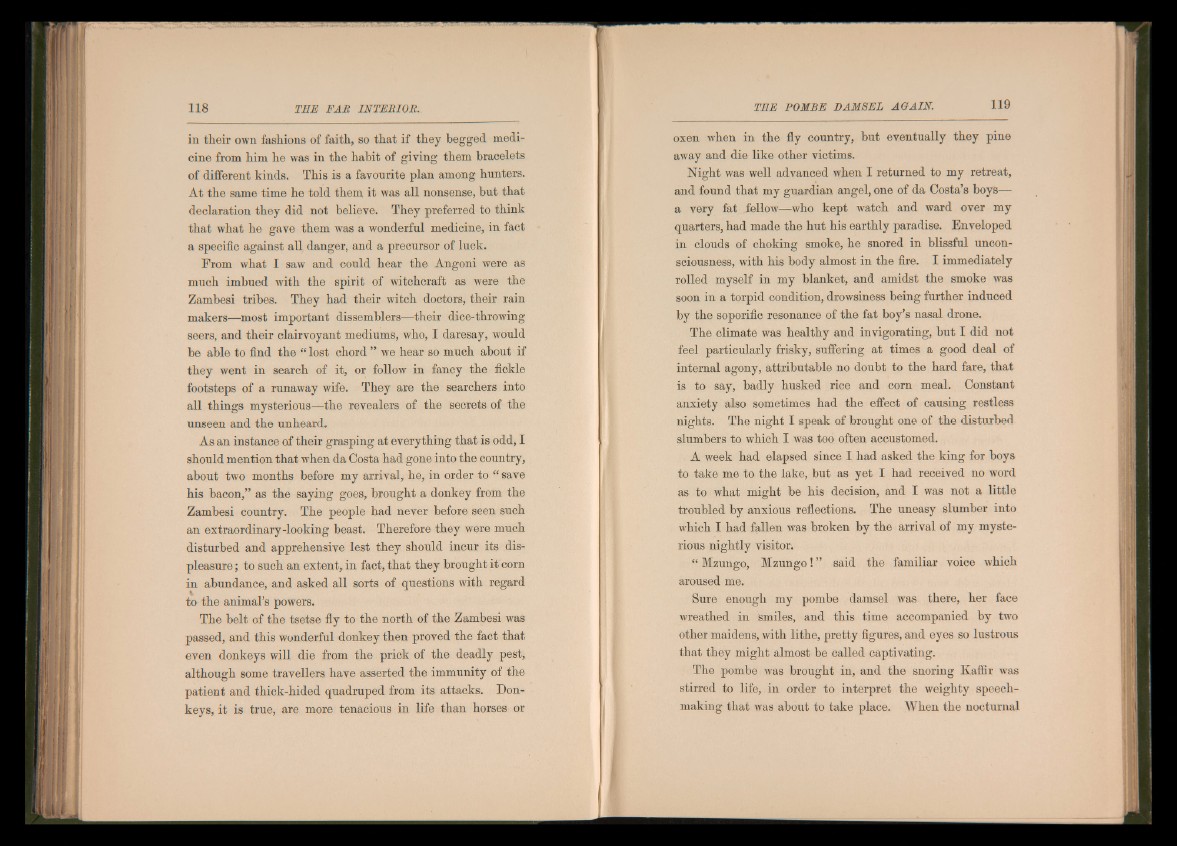
in their own fashions of faith, so that if they begged medicine
from him he was in the habit of giving them bracelets
of different kinds. This is a favourite plan among hunters.
At the same time he told them it was all nonsense, but that
declaration they did not believe. They preferred to think
that what he gave them was a wonderful medicine, in fact
a specific against all danger, and a precursor of luck.
From what I saw and could hear the Angoni were as
much imbued with the spirit of witchcraft as were the
Zambesi tribes. They had their witch doctors, their rain
makers—most important dissemblers—their dice-throwing
seers, and their clairvoyant mediums, who, I daresay, would
be able to find the “ lost chord ” we hear so much about if
they went in search of it, or follow in fancy the fickle
footsteps of a runaway wife. They are the searchers into
all things mysterious—the revealers of the secrets of the
unseen and the unheard.
As an instance of their grasping at everything that is odd, I
should mention that when da Costa had gone into the country,
about two months before my arrival, he, in order to ft save
his bacon,” as the saying goes, brought a donkey from the
Zambesi country. The people had never before seen such
an extraordinary-looking beast. Therefore they were much
disturbed and apprehensive lest they should incur its displeasure
; to such an extent, in fact, that they brought it corn
in abundance, and asked all sorts of questions with regard
to the animal’s powers.
The belt of the tsetse fly to the north of the Zambesi was
passed, and this wonderful donkey then proved the fact that
even donkeys will die from the prick of the deadly pest,
although some travellers have asserted the immunity of the
patient and thick-hided quadruped from its attacks. Donkeys,
it is true, are more tenacious in life than horses or
oxen when in the fly country, but eventually they pine
away and die like other victims.
Night was well advanced when I returned to my retreat,
and found that my guardian angel, one of da Costa’s boys—
a very fat fellow—who kept watch and ward over my
quarters, had made the hut his earthly paradise. Enveloped
in clouds of choking smoke, he snored in blissful unconsciousness,
with his body almost in the fire. I immediately
rolled myself in my blanket, and amidst the smoke was
soon in a torpid condition, drowsiness being further induced
by the soporific resonance of the fat boy’s nasal drone.
The climate was healthy and invigorating, but I did not
feel particularly frisky, suffering at times a good deal of
internal agony, attributable no doubt to the hard fare, that
is to say, badly husked rice and com meal. Constant
anxiety also sometimes had the effect of causing restless
nights. The night I speak of brought one of the disturbed
slumbers to which I was too often accustomed.
A week had elapsed since I had asked the king for boys
to take me to the lake, but as yet I had received no word
as to what might be his decision, and I was not a little
troubled by anxious reflections. The uneasy slumber into
which I had fallen was broken by the arrival of my mysterious
nightly visitor.
“ Mzungo, Mzungo! ” said the familiar voice which
aroused me.
Sure enough my pombe damsel was there, her face
wreathed in smiles, and this time accompanied by two
other maidens, with lithe, pretty figures, and eyes so lustrous
that they might almost be called captivating.
The pombe was brought in, and the snoring Kaffir was
stirred to life, in order to interpret the weighty speech-
making that was about to take place. When the nocturnal